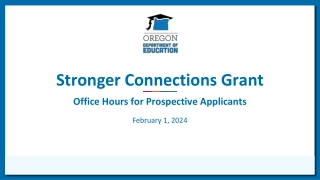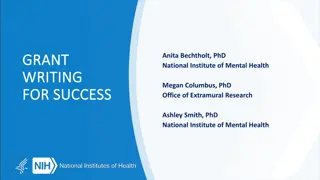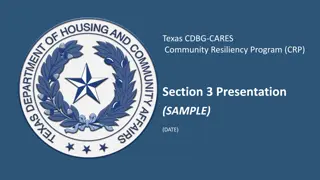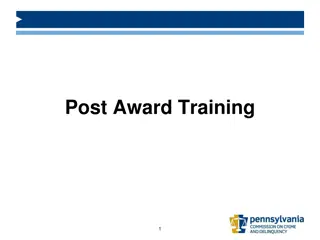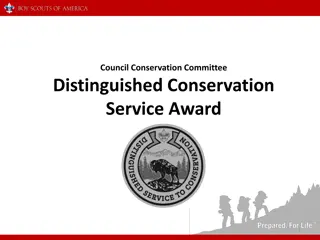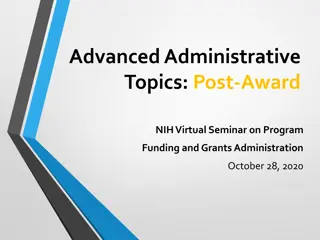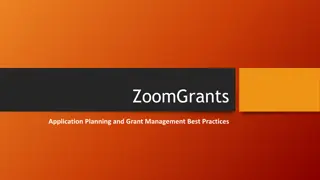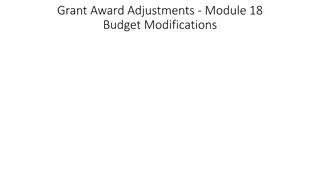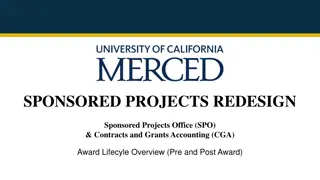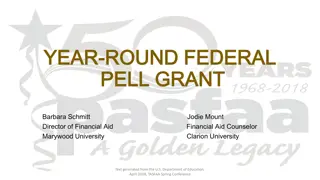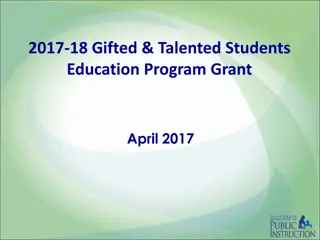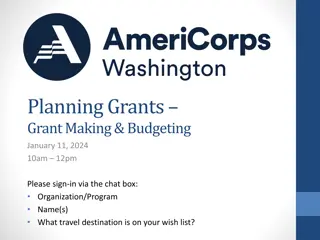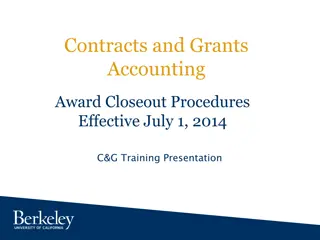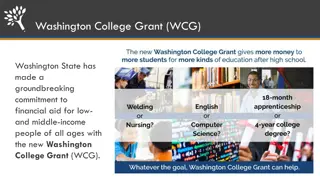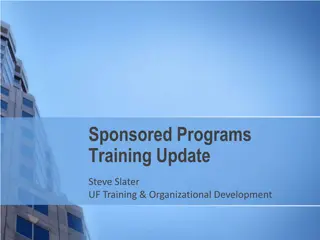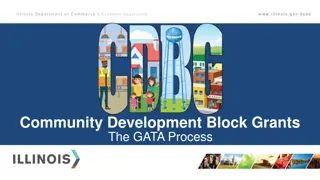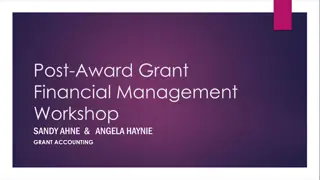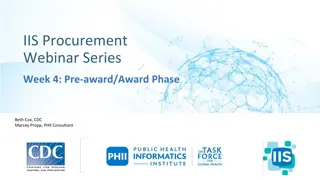Grant Management Training: Post-Award Basics Workshop
This comprehensive workshop covers post-award basics in grant management, including contracts and grants accounting, new fund requests, grant budgets, personnel actions, purchase order management, financial reporting, and closeout processes. Key steps in the post-award process are detailed, such as fund requests, budget establishment, expenditure allocation, procurement guidelines, invoicing, and final reporting for grant closure.
Download Presentation

Please find below an Image/Link to download the presentation.
The content on the website is provided AS IS for your information and personal use only. It may not be sold, licensed, or shared on other websites without obtaining consent from the author.If you encounter any issues during the download, it is possible that the publisher has removed the file from their server.
You are allowed to download the files provided on this website for personal or commercial use, subject to the condition that they are used lawfully. All files are the property of their respective owners.
The content on the website is provided AS IS for your information and personal use only. It may not be sold, licensed, or shared on other websites without obtaining consent from the author.
E N D
Presentation Transcript
Grant Management Training Post-Award Basics Contracts and Grants Accounting (CGA) 2
Workshop Agenda Post-Award Basics New Fund Request Grant Budget Personnel Actions (ePAFs, LRDs) Purchase Order and Encumbrance Management Billing and Financial Reporting Closeout Process 3
Post-Award Process Office of Sponsored Programs (SP) or Institutional Advancement (IA) notifies Principal Investigator (PI), departmental staff, and Contracts and Grants Accounting (CGA) of new award. Award Notification Department obtains approvals from IRB, IACUC, IBC, etc., if necessary. SP executes subaward agreements, if applicable Post-Award Prep Department requests new fund through the New Fund Request System. https://fund.app.texastech.edu/fundProcessing/fundStart New Fund Request Department establishes project budget through the Budget Revision System. https://banapps.texastech.edu/ITIS/BD_BudgetRevision/default.aspx Budget 5
Post-Award Process (Continued) Department completes ePAF and/or LRD to allocate salary charges to new fund. Project Personnel Department procures goods and services following the Purchasing Manual guidelines. Other Project Expenditures CGA or department, as determined, submits invoices to sponsor for advance or reimbursement. Billing PI/Department completes required programmatic reports. CGA prepares required financial reports. Reporting 6
Post-Award Process (Continued) Department reviews expenditures and payments since inception and any outstanding encumbrances. CGA reviews expenditures since inception and final invoices. Closeout Depending on grant, SP, IA, and CGA may submit final reports to sponsor. Final Reporting Department requests to terminate the fund through the Terminate Fund System. Termination Fund 7
New Fund Request Once award is received, submit a New Fund Request. The NFR system can be accessed from the TTUHSC El Paso WebRaider Portal, under the HSC Finance El Paso tab as shown below. Click on Finance Fund Maintenance under the Accounting section of the HSC Finance El Paso tab: https://fund.app.texastech.edu/ 8
New Fund Request Required documentation attached to the request should include, but may not be limited to: Award letter and/or executed agreement. Sponsor approved budget from award notice/grant proposal, including a detailed budget justification, as appropriate. Cost Share/Matching Information, if applicable (Refer to HSCEP OP 65.11). Sub-recipient information, if applicable (Refer to HSCEP OP 65.09). Project start and end date, PI name, salary cap amount, if applicable. Financial report due dates, scheduled payment dates, if applicable. Grant guidelines for private agencies, if applicable. Institutional Review Board approval, if applicable. You re welcome to attach any other document that might be important, such as a report template and correspondence from sponsor approving project changes. 9
When is a new fund needed? All sponsored projects should have a separate fund created in order to properly track and segregate the financial activity and budget specific to a grant/contract. Most grants/contracts will only have one fund for the duration of the project, with a few exceptions: If it s a federal direct grant and the federal cash drawdown method changes during the project, a new fund might be required for the affected project period. If it s a pass-through grant, regardless of whether it s federal, state or private, and the pass-through entity imposes unusual restrictions on how a carry forward amount can be used or demands a clear separation of budgets between grant years, then a new fund might be required for each grant year. If there is substantial financial reporting required by grant or contract year, a separate fund for each project year might be required. If there are multiple billing method requirements or the billing method changes from one project period to another (e.g. cost reimbursement to fee-for-service), a separate fund will be required for each billing method. An amendment, revision, or subsequent notice of award for an existing project does not constitute a new grant/contract, so there might not be a need to set up a new fund. 10
NFR Guidance The Finance Fund Maintenance system is shared by TTUHSC El Paso (Chart E), TTUHSC (Chart H), TTU (Chart T) and the TTU System (Chart S) so you must select the proper entity in order for Banner to identify the proper Chart Code. For El Paso, select E - Texas Tech Univ Hlth Sci Ctr El Paso. Then, select the appropriate fund class. Identify your fund class in next slide: 11
Identify Your Fund Class 10 - Educational and General.- State Appropriated Funds. General revenue appropriations provided by the Legislature to support general education operations. 10Z - Coordinating Board.- Projects or grants as approved by the Texas Higher Education Coordinating Board, i.e., Advanced Research Programs (ARPs), funded through appropriations in the state Treasury. 11 - HEAF Unallocated 11Z HEAF.- Appropriations provided by the legislature for capital expenditures such as land, construction, major repair and rehabilitation of buildings, capital equipment, and library materials. 12 - Permanent Health Funds.- Programs funded from Permanent Health Funds (Tobacco funds) that benefit medical research, health education, or treatment programs. 12Z - Permanent Health Funds Seed Grants.- Seed grants funded from Permanent Health Funds. 13 - Medical Practice Income Plan MPIP.- Revenue and expenditures related to patient care or other activities of the practice plan. 18 - General Designated.- Resources internally allocated by the governing board or management - Student fee funds. - Facility and Administrative (Indirect Cost) recovery from sponsored program funds. 18Z - General Designated Grants.- Seed grants from unrestricted funds. 19 - Service Departments.- Ongoing operations that sell products and provide specific services to other TTUHSC El Paso departments. - Lab services 20 - Non-Federal Scholarships.- Scholarships funded from gifts from external sources (including endowment earnings) or internally designated funds. Use is restricted to scholarship expense. 20Z - Federal Scholarships.- Pell, SEOG. 21Z - Federal Govt Grants/Contracts.- Includes direct program grants and Federal funds passed to TTUHSC El Paso from other agencies. Use is restricted to conditions agreed upon in the grant/contract. 22Z - State Govt Grants/Contracts.- Grants or contracts from other state of Texas entities, including state funds passed to TTUHSC El Paso from other agencies. Use is restricted to conditions agreed upon in the grant/contract. 23 - Local Govt Gifts/Earnings Funds.- Gifts or endowment earnings from local government agencies. Use is restricted to conditions agreed upon in donor correspondence. 23Z - Local Govt Grants/Contracts.- Grants or contracts with local government agencies. Use is restricted to conditions agreed upon in the grant/contract. 24 - Private Gifts/Earnings Funds.- Gifts from private agencies, foundations or individuals - Non-scholarship earnings from endowments. - Use is restricted to conditions agreed upon in donor correspondence. 24Z - Private Grants/Contracts.- Grants or contracts with private entities. Use is restricted to conditions agreed upon in the grant/contract. 30 - Auxiliary Enterprises.- Entity that exists predominantly to furnish goods and services to students, faculty or staff outside the research and education functions. - Charges a fee directly related to the cost of goods and services. - Traffic and Parking - Bookstore 40 - Federal Loans.- Federally Funded Loans - Funds available for loans to students 41 - Institutional Loans.- Non-Federal Loans - Funds available for loans to students - Funding provided from internal sources or from private donations. 50 - Funds Functioning as Endowments.- Internal resources that TTUHSC El Paso, rather than a donor, has determined are to be retained and managed like an endowment and are approved by the Board of Regents. - Principal and income may be utilized at the discretion of TTUHSC El Paso - Expenditures may be restricted or unrestricted. 60 - Permanent Endowments.- External resources that a donor has determined are to be maintained in perpetuity o Corpus must remain intact. o Earnings from endowment corpus can be expended or reinvested with the original gift as stipulated by the donor. 80 - Student and Other Agency Funds.- Resources held on behalf of external parties - Used to report resources held by TTUHSC El Paso in a purely custodial capacity 84 - TTFI Unrestricted 85 - TTFI Endowments.- External resources gifted to TTFI that a donor has determined are to be maintained in perpetuity - Corpus must remain intact - Earnings from endowment corpus can be expended or reinvested with the original gift as stipulated by the donor 8A - TTFI Quasi Endowments 9EZ - Unexpended Plant Perm Health Funds.- Used to record expenditures for a project until completion - Funded from Permanent Health Funds (Tobacco funds) 9FZ - Unexpended Plant HEAF.- Used to record expenditures for a project until completion. Funded from HEAF funds. 9GZ - Unexpended Plant Tuition Rev Bonds.-Used to record expenditures for a project until completion. Funded from Tuition Revenue Bond proceeds 9HZ - Unexpended Plant Local Funds.- Used to record expenditures for a project until completion. Funded from internal local funds such as MPIP funds or restricted funds. 12
NFR Guidance Based on selection of Fund Class you choose, your request maybe routed to additional forms to gather information related to the following areas: Sponsored programs Research Definitions as defined by the NSF Research Survey, refer to next slides. Scholarships Gifts Foundation/Endowments Recommended Reading: HSCEP OP 02.08 - Operation & Maintenance of Endowment Funds. This OP will provide guidance in picking the correct level, type, and owner of an endowment. 13
NFR Guidance Begin completing the Main Fund Information form: Fund name is usually a shortened version of the long project title. This field is limited to 35 characters only. Some special cases have a prefix for quick identification. For example: CPRIT for CPRIT grants CS for cost share funds GF for a gift SEED for SEED grants EARN for endowment earnings Sponsored Project Type: Select SP for grants/contracts and CT for industry-sponsored clinical trial agreements Select the appropriate cost share classification if request is for a cost share fund (mandatory/voluntary committed, salary cap, voluntary uncommitted) 14
NFR Guidance: restricted funds If selected YES to the Research question You will have to complete the first six questions to determine whether the new fund requested under research program code 20 should be classified as organized research for the F&A cost rate proposal. Also complete the research activity type, research field, and area of study data 15
Research Definitions Research and Development definition from OMB Uniform Guidance 2 CFR Part: Research is defined as a systematic study directed toward fuller scientific knowledge or understanding of the subject studied. Development is the systematic use of knowledge and understanding gained from research directed toward the production of useful materials, devices, systems, or methods, including design and development of prototypes and processes. The National Science Foundation divides R&D activities into the following three categories: Basic Research is experimental or theoretical work undertaken primarily to acquire new knowledge of the underlying foundations of phenomena and observable facts, without any particular application or use in view. Applied Research is original investigation undertaken in order to acquire new knowledge. It is directed primarily towards a specific, practical aim or objective. Experimental Development is systematic work, drawing on knowledge gained from research and practical experience and producing additional knowledge, which is directed to producing new products or processes or to improving existing products or processes. 16
NFR Guidance: restricted funds Effort Reporting Effort Reporting Required should be Yes for all sponsored projects. Even if sponsor does not require effort reporting, we re requiring this higher standard on all sponsored projects for increased oversight over salary expenditures. NFR training: https://elpaso.ttuhsc.edu/fiscal/businessaffairs/finsysmgt/_documents/Finance- Fund-Maintenance-System.pdf 18
Establishing Sponsored Project Budget Once the new fund for your project has been established, set up the project s budget by completing a budget revision through the Budget Revision System. Attachments Required: Notice of Award, Contract, or Agreement Sponsored approved Budget. The budget must be established exactly as shown on the grant agreement. 19
Establishing Sponsored Project Budget Use budget revision type 3 - this option is used to increase a revenue budget. The department must verify that the current revenue budget will be exceeded before budgeting an increase in revenue. Budget Revision System training: https://elpaso.ttuhsc.edu/fiscal/businessaffairs/budget/_documents/instructions_info rmation/Budget_Revision_System_User_Guide.pdf 20
Establishing Sponsored Project Budget Budget all expense account codes to the penny, including IDC-Indirect Costs (BACs 7055). Example: Received a $100,000 grant with an IDC rate of 60%. $100,000 / 1.60 = $62,500 Direct expenses budget amount $62,500 * 60% = $37,500 Indirect expenses budget amount $62,500 + 37,500 = $100,000 total awarded amount 21
Establishing Sponsored Project Budget Depending on the type of fund is being budgeted and what kind of budget type is being entered, the Budget Revision may be routed through Fund Manager, Regional Dean, OSP, Contracts and Grants Accounting and the Budget Office. Once budget revision is fully approved and you receive email notification that it has posted to Banner, you re ready to start processing charges against new fund!! 22
Grant Personnel Actions Current and Future Labor Change Submit a labor changer ePAF to have all future salaries (and salary encumbrances) moved to the new grant fund. Process this type of ePAF for the PI and other grant personnel to allocate the appropriate percent effort to the grant FOP. Submit the ePAF a couple of business days before the established Payroll deadline in order for the change to be effective as of a specific pay period. 23
Grant Personnel Actions Labor Redistributions (LRDs) To charge salary to a grant for pay periods that have already passed, a labor redistribution must be completed. Note that LRDs for pay periods that fall in prior fiscal years are only allowed if unallowable salary charges need to be moved off the grant FOP. 24
Grant Personnel Actions Labor Redistribution System is available on the Budget Office website: LRDs User Guide also available on the Budget Office website: https://elpaso.ttuhsc.edu/fiscal/businessaffairs/budget/_documents/i nstructions_information/LaborRedistributionUserGuide.pdf 25
Grant Personnel Actions Institutional Base Salary OP 65.07 defines Institutional Base Salary (IBS) for purposes of budgeting and charging salaries to sponsored programs. IBS is essentially composed of all salaried appointments, both primary and secondary positions. Budget proposals, ePAFs, LRDs, salary cap calculations, effort reporting, and any other personnel action allocating or charging salaries to a sponsored program should follow this definition of IBS. This policy complies with the OMB Uniform Guidance, which states in Section 200.430(h)(2): IBS is defined as the annual compensation paid by an IHE [Institute of Higher Education] for an individual s appointment, whether that individual s time is spent on research, instruction, administration, or other activities. 26
Grant Salary Expense Considerations Labor is very important and must be applied to each grant fund exactly how it was budgeted with the sponsor. Charge committed effort percentage throughout the project period. Make use of the Multiple Positions Cost Share Calculation Worksheet to simplify salary cap and mandatory/voluntary cost share calculations for personnel holding multiple positions located in https://elpaso.ttuhsc.edu/fiscal/businessaffairs/grantaccou nting/_documents/multiple-positions-effort-calculation- worksheet.xls Effort certification will be required for all salary expenses charged to sponsored program FOPs. 27
Procurement Standards Institutional purchasing OPs are applicable for all sponsored programs, unless sponsor-specific guidelines are more restrictive. Follow the Purchasing Manual when procuring goods and services. https://elpaso.ttuhsc.edu/fiscal/businessaffairs/purchasi ng/policy.aspx Non-compliant purchase orders will not be allowed on grants. 28
Purchase Order and Encumbrance Management Periodically review all open purchase orders using Cognos reports. Be proactive instead of reactive. If you know a purchase order was not allocated to the correct FOP or will be deemed unallowable, submit a change order through the PO/Encumbrance Change Request System. Note that any open encumbrances as of the grant end date are particularly scrutinized by CGA. Goods and services not received by the grant end date will not be allowed on the grant. Make sure the receipt date in TechBuy is the date you actually received the goods or the date when services were completely or substantially rendered. Invoices for allowable purchase orders can still be paid after grant end date. Note that there might be time constraints that may require quick processing of outstanding invoices, depending on the final financial report and final invoice deadlines imposed by sponsor. 29
Other Common Grant Expenditures Travel Applications and Vouchers Foreign travel requires prior approval from the president Follow travel operating procedures and policies (lodging rates, alcohol disallowance, tips, etc.) https://elpaso.ttuhsc.edu/fiscal/businessaffairs/paymentser vices/Policies.aspx Swift Cards Active IRB approval must be in place at time of request, if applicable. 30
Getting Paid: Billing Procedures Most cost reimbursement grants are invoiced by CGA Federal cash drawdowns for NIH,HRSA, and NSF grants completed every Monday Quarterly FSRs for CPRIT grants Monthly cost reimbursement invoices for federal pass-through grants, state grants, and private grants/contracts. Department responsible for invoicing for fee-for-service contracts and any project involving milestones/deliverables. Most fee-for-service contracts route through Contracting, so make use of the Contract A/R System to recognize the revenue and record the account receivable for every invoice. Clinical trials invoicing process: Research Office will submit invoices for startup fees. IRB Office will submit invoices for initial and continuing review fees for industry-sponsored clinical trials. Department will need to submit invoices based on subject visits or milestones, if invoices are required by sponsor. 31
Financial Reporting CGA responsible for generating grant financial reports: Tracking of financial report due dates Obtaining appropriate signature(s) Processing cost share certifications Ad-hoc financial report requests are welcomed with reasonable advance notice Estimates of unobligated balance for no-cost extensions and carryover requests should be completed by CGA 32
Grant Closeout Automated email sent to fund manager and PIs 70 and 30 days before grant end date. If an extension of the grant end date is necessary, contact SP or IA, as applicable, to request approval for an extension from the sponsor. If project ended, submit a Terminate Fund Request through the system: https://fund.app.texastech.edu/fundProcessing/terminateFund Make sure you review the grant fund. CGA will be in contact whenever action is required by department. Most common issues found at the end of the grant period are invalid open encumbrances and pending cost transfers and labor redistributions. More actions to consider, next slide: 33
Grant Closeout Action Items to Consider: Collect all amounts due. Ensure all revenues have been received and placed in the grant fund. Final invoices. If pass-thru subcontracts were executed, ensure all final invoices have been reviewed and posted to the grant. Send all outstanding invoices to Accounts Payable. Ensure expenses charged to grant were incurred within the grant period of performance. Review all open encumbrances on the fund. All encumbrances must be zero and closed in order foe the fund to be closed. If valid -> remain If not valid -> submit PO and encumbrance change request. 34
Grant Closeout Action Items to Consider: Return unused swift cards. If effort reporting was required, ensure all statements have been certified. Prepare programmatic reports. Cover budget overruns. Request grant financial report from CGA. Transfer residuals (if applicable) Review and have PI sign internal FSR for federal grants only. Respond to questions from CGA. Retain project records according to sponsor guidelines. 35
Grant Financial Management Tips Review payroll reports at least once a month and ensure faculty/staff salary distribution fulfills effort commitments on grant proposals/applications. Review transactions on grant FOPs at least once every two weeks and complete cost transfers (audit red flag for CTs over 90 days). Recalculate effort percent charged to grant and cost share funds every time there is a salary increase or secondary appointment. Be up to date on the latest salary cap amount for DHHS grants. Do not create new purchase orders during the last two weeks of the grant unless essential items are still needed and goods/services will be received on or before the grant end date. 36
Questions??? 37


